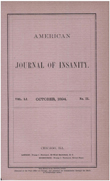Homosexuality in men and number of older brothers
Abstract
OBJECTIVE: This study investigated whether homosexual men have a higher mean birth order than heterosexual men primarily because they have more older brothers or because they have more older siblings of both sexes. METHOD: For the main analyses, 302 heterosexual men were individually matched on year of birth with an equal number of heterosexual men. Each completed a self-administered, anonymous questionnaire concerning family background and other biodemographic information. RESULTS: Logistic regression analysis showed that homosexuality was positively correlated with the proband's number of older brothers but not with older sisters, younger brothers, younger sisters, or parental age at the time of the proband's birth. Each additional older brother increased the odds of homosexuality by 33%. CONCLUSIONS: These results restrict the range of possible theories of the birth order phenomenon to those that can explain not only why older brothers increase the probability of homosexuality in later-born males but also why older sisters neither enhance this effect nor counteract it.
Access content
To read the fulltext, please use one of the options below to sign in or purchase access.- Personal login
- Institutional Login
- Sign in via OpenAthens
- Register for access
-
Please login/register if you wish to pair your device and check access availability.
Not a subscriber?
PsychiatryOnline subscription options offer access to the DSM-5 library, books, journals, CME, and patient resources. This all-in-one virtual library provides psychiatrists and mental health professionals with key resources for diagnosis, treatment, research, and professional development.
Need more help? PsychiatryOnline Customer Service may be reached by emailing [email protected] or by calling 800-368-5777 (in the U.S.) or 703-907-7322 (outside the U.S.).



